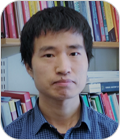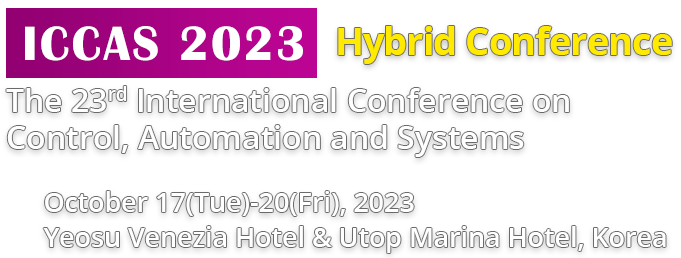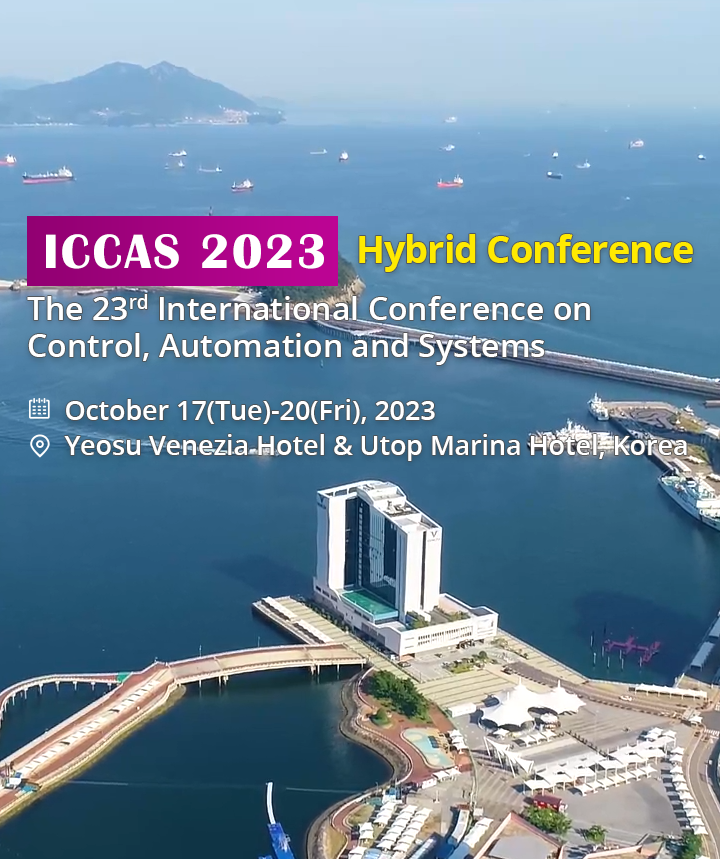Invited Talk for Open Invited Session
Invited Talks for Open Invited Sessions
 [WB5] Recent Advances in Multi-agent Systems and Control 2
[WB5] Recent Advances in Multi-agent Systems and Control 2Time: October 18(Wed), 13:00-14:30
Place: Room 5 (Festa)
 |
Autonomous motion coordination of multi-vehicle systems Prof. Zhiyong Sun Eindhoven University of Technology, Netherlands Time:13:00-13:30 Abstract & Biography
Abstract This talk will present recent research work of autonomous systems and motion control at the Autonomous Motion Control (AMC) lab at TU Eindhoven. We then focus on constrained motion control of muti-vehicle systems, while we aim to address various heterogenous motion constrains arising from many practical vehicle systems with different kinematics/dynamics motion equations. Lastly, we discuss emerging research topics on multi-vehicle formation control with spatio-temporal constraints. Biography Zhiyong Sun received the Ph.D. degree from The Australian National University (ANU), Canberra ACT, Australia, in February 2017. He worked as a Research Fellow/Lecturer at ANU of Australia, and then a Postsdoc Fellow at Lund University of Sweden. He has won the Springer Best PhD Thesis Award, and several best paper and student paper awards from CDC, AuCC, ICRA and CCTA. Since January 2020 he joined Eindhoven University of Technology (TU Eindhoven), the Netherlands, as an assistant professor. His research interests include multi-robotic systems, control of autonomous formations, distributed control and optimization. |
 |
Control Theory for Generalized Coordination of Multi-robot Systems Prof. Kazunori Sakurama Kyoto University, Japan Time:13:30-14:00 Abstract & Biography
Abstract Control methods for multi-robot systems have massive potential for practical applications, including autonomous vehicles, cluster satellites, and sensor networks. In many applications, cooperative coordination plays a central role. Various methods have been developed for coordination tasks, such as consensus, formation, coverage, and pursuit. Most developments of control methods have taken place for each task individually so far. This talk aims to provide a systematic method to design controllers applicable to a wide range of coordination tasks for multi-robot systems. To this end, we describe the coordination problem in a unified manner instead of handling various problems individually. Then, a complete solution to this problem is provided compactly using the tools of group and graph theories. This talk presents the core ideas of the control theory specific to multi-robot systems and shows practical examples of coordination tasks achievable through this theory. Biography Kazunori Sakurama received a Bachelor’s degree in engineering and Master’s and Doctoral degrees in Informatics from Kyoto University, Kyoto, Japan, in 1999, 2001, and 2004, respectively. He was an Assistant Professor at the University of Electro-Communications, Tokyo, Japan, from 2004 to 2011 and an Associate Professor at the Graduate School of Engineering, Tottori University, Tottori, Japan, from 2011 to 2018. He is currently an Associate Professor at the Graduate School of Informatics, Kyoto University, Kyoto, Japan. His research interests include control of multi-agent systems, networked systems, and nonlinear systems. He received the Control Division Conference Awards in 2014 and 2015, the Control Division Pioneer Award in 2017, and the Control Division Kimura Award in 2022 from the Society of Instrument and Control Engineers (SICE). He is a member of IEEE, SICE, and the Institute of Systems, Control, and Information Engineers (ISCIE). |
| 14:00-14:15 Parallel Operation of Electric Motors with Nonidentical Power Ratings Kwang-Kyo Oh Sunchon National University, Korea |
|
| 14:15-14:30 An H∞ Robust Consensus Control for Distributed Multi-Agent Systems Characterized by Uncertain Time-Varying Topologies Junghoon Kim, Dohyeok Kwak, Jung Hoon Kim POSTECH, Korea |
|
 [WC5] Recent Advances in Multi-agent Systems and Control 3
[WC5] Recent Advances in Multi-agent Systems and Control 3Time: October 18(Wed), 16:00-17:30
Place: Room 5 (Festa)
 |
Decentralised adaptive-gain control for epidemic spreading on networks Dr. Mengbin Ye Curtin University, Australia Time:16:00-16:30 Abstract & Biography
Abstract This talk provides an overview of recent approaches using adaptive-gain control and feedback principles to “close-the-loop” on infectious disease dynamics. We consider the deterministic SIS network model for epidemic spreading on a meta-population network, where we assume the network is above the epidemic threshold and thus the disease becomes endemic if left uncontrolled. A class of decentralised adaptive-gain controllers are proposed which dynamically adjust the infection or recovery rates, representing non-pharmaceutical and medical interventions, respectively. The effectiveness and challenges associated with such controllers are explored using theoretical analysis and simulations, first assuming we can control all nodes in the network, and then relaxing to consider controlling a subset of the nodes. Biography Mengbin Ye received the B.E. degree (with First Class Honours) from the University of Auckland in 2013. His Ph.D. degree in engineering was completed under the supervision of Emeritus Professor Brian D.O. Anderson, AC, at the Australian National University in 2018. From 2018-2020, he was a postdoctoral researcher with the Faculty of Science and Engineering, University of Groningen, Netherlands. In 2021, he commenced a four-year Western Australian Premier’s Early to Mid-Career Fellowship, at the Centre for Optimisation and Decision Science, Curtin University. He has received the J.G. Crawford Prize (Interdisciplinary) in 2018, ANU’s premier award recognising graduate research excellence, and the 2018 Springer PhD Thesis Prize. His current research interests include opinion formation and decision making in complex social networks, epidemic modelling and control, and cooperative control of multi-agent systems. |
| 16:30-16:45 Preliminary Results on Ultra-Wideband Range Measurements Model Considering a Directional Bias based on Spherical Harmonics for Drone Swarm Taekyun Kim, Dongjun Lee Seoul National University, Korea |
|
| 16:45-17:00 Multiplex PID consensus for single integrator agents YoungHun Lim Gyeongsang National University, Korea |
|
| 17:00-17:15 Quantization-Aware Encrypted Consensus Protocol for Second-Order Multi-Agent Systems Hung Manh Nguyen, Hyo-Sung Ahn GIST, Korea |
|
| 17:15-17:30 Tilted Circumnavigation of Multiple Drones Around Multiple Targets Mirzobek Malikov, Vladimir Shin, Yoonsoo Kim Gyeongsang National University, Korea |
|


